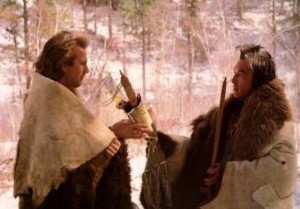Do you keep your word? Or are you an “indian giver?”
 Do you keep your word? Or are you an “Indian Giver?” Do you even know what that means?
Do you keep your word? Or are you an “Indian Giver?” Do you even know what that means?
When I was a child, the term “Indian giver” was thrown around as a derogatory term when someone gave something and then wanted it back.
At the time, I thought it meant that Native Americans used to do that: give gifts then take them back.
But I was wrong.
The origin of the term is a bit murky: there are references back in the 1790s of Europeans complaining about Natives asking for remuneration for things they gave the Europeans.
Why would the Europeans complain about that? Why wouldn’t they expect to give a fair exchange?
A Good Trade
Native Americans are very conscious of fair exchange. Hence the teaching, “It’s hard for us to say, ‘Thank you,’ without something in our hand.”
You might recall the scene in “Dances with Wolves” where, after a hunt, one of the Natives was wearing the hat of the Lieutenant [Kevin Costner] and didn’t want to give it back:
“He left it on the prairie. He didn’t want it.”
But it was clear the Lieutenant did want it back.
Given a reminder of tribal custom, the man was encouraged to give something to the Lieutenant in exchange for the hat. Something that was considered a “good trade.”
The history of broken treaties
A typical complaint among Native Americans about the Europeans was that they like to take, but not to give in return.
In fact, the term for “white man” among the Lakota is wasichu. It means “fat taker” – one who takes the best for themselves.
There were over 500 treaties signed between the U.S. government and Native American nations.
These treaties gave the Natives guarantees of land where they could live and hunt in peace, without intrusion by European settlers.
All the treaties were broken by the U.S. Government – all of them. None were broken by Native Americans.
I have come to learn that the term “Indian giver” actually refers to the U.S. government who gave reservation land to Native peoples, then took it back when they found a more lucrative use for it.
So “Indian givers” were our ancestors who gave to the Indians and then took away. Shameful, actually.
Keeping your word
Keeping one’s word is a core teaching of Native American culture. In The Wind Is My Mother Bear Heart tells this story of his friend Billy Osceola:
I have a friend in Florida whose name is Billy Osceola and he’s a minister of the Seminole Independent Baptist Church. There was a non-Indian minister from Illinois who was visiting Florida, and he invited Billy to speak in his church.
“When do you want me to come?”
“Well, how about the first Sunday in April.”
“O.K.”
This was in July, so it meant nine months off.
I was living in Oklahoma City that next April and I got a call from Billy as he was passing through. He said, “I’m on my way to Illinois. I’m going to preach for a friend I met from there.”
There had been no conversation or written correspondence of any kind since July, but Billy had given his word.
A few days later he came back through Oklahoma City. The man who had invited him had forgotten.
But Billy gave his word nine months before to go back there and he lived up to his part of the bargain. He didn’t realize that, in white culture, most people would send a confirming letter and see if the date was still on.
When Native people give their word they don’t have to have it notarized, they don’t have to sign papers and they don’t have to confirm. That’s why we as Indians call white people the “paper tribe” — everything has to be written down on paper.
You need birth certificates, diplomas and resumes to prove who you are and what you’ve done. Reports must be in triplicate — one goes to that office, another goes to this office, another goes over to the bathroom. You see, it’s a waste. Give your word and live up to your word.
So, don’t be an “Indian Giver” – don’t be one who gives your word and then takes it back. If you make a commitment, keep it.
Learning that very simple life rule is one of the keys to successful living.
Is there a commitment in your life you’re not fulfilling?
What is your responsibility?
Take a good look at where you can improve.
It builds character and everything else good flows from that.
Molly Larkin is the co-author of the international best-seller “The Wind Is My Mother; The Life and Teachings of a Native American Shaman” and other books on health. She is passionate about helping people live life to their fullest potential through her classes, healing practice and blog at www.MollyLarkin.com

